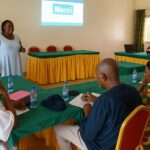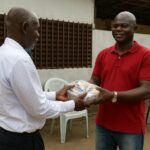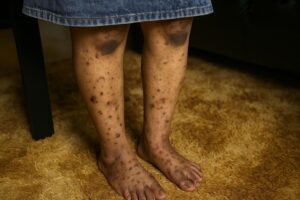Vaccine countdown fuels new urgency
Brazzaville is days away from receiving its first batch of cholera vaccine, a milestone health authorities hope will stem an outbreak that has already touched three departments. With the delivery in sight, young volunteers of the U-Report network are stepping up to keep communities alert.
On 8 September, U-Report country lead Schariette Orsili Manguida told reporters that her teams “are fully committed to support the Ministry of Health and UNICEF in a massive, youth-centred awareness drive” aimed at cutting transmission and boosting trust in vaccination.
Inside the U-Report movement
U-Report is a youth platform linked to UNICEF’s country office. It operates like a social pulse, letting volunteers exchange texts, polls and voice notes with thousands of peers while feeding verified feedback to decision-makers.
Because the service already reaches phones in every arrondissement, public-health officials view it as a natural partner for quick, low-cost cholera alerts that can outpace rumours.
Three pillars guide the response
Manguida explained that the programme rests on information, community data collection and engagement. “We will use our platform to spread approved messages, run surveys and reinforce local participation,” she said, emphasising that two-way communication will remain constant.
The first pillar—information—relies on short texts, memes and audio spots that translate medical advice into everyday slang young people share. Content is cleared by the Health Ministry before being pushed to phones.
The second and third pillars merge on the ground. Volunteers survey residents about water sources, symptoms and rumours, then mobilise neighbourhood leaders to answer concerns in real time, strengthening confidence in clinics already stretched by other priorities.
Listening to young voices
Past polling has shown teenagers often know cholera symptoms but underestimate how quickly dehydration can be fatal. New surveys will test knowledge gaps again, letting educators tweak messages before the vaccine roll-out begins.
Collecting opinions also lets officials gauge whether restrictions on street food or hand-washing campaigns are being followed, a vital piece of intelligence in quarters where official inspectors seldom reach.
Fighting rumours in every language
Manguida insists that no message will stay in French only. “We must integrate national languages and dialects to kill misinformation at its root,” she said, noting that upcoming radio spots will run in Kituba and Lingala alongside French.
By translating quickly, U-Report aims to counter claims that the vaccine is experimental or that mild post-shot fever means failure. Volunteers are trained to explain that a short bout of fever can be treated with paracetamol and does not undermine protection.
Congo’s first cholera vaccination drive
Health officials will invite residents in high-risk zones to receive the oral vaccine, a two-dose regimen proven to cut transmission when paired with hygiene measures. It will be Congo-Brazzaville’s debut use of the product.
“Avoid rumours around this vaccination; it exists for our good,” Manguida urged, warning that the first hour after intake may trigger light reactions that pass quickly.
For clinics, the coming weeks mean preparing cold chains, updating registries and briefing staff on what to tell parents who fear side effects. U-Reporters will stand at facility doors, translating and guiding queues to keep the process smooth.
Rainy season raises the stakes
Civil-society groups worry that the approaching school term and seasonal rains could widen the outbreak. Flooded streets often contaminate wells, making hand-washing and safe water storage harder.
With 425 suspected cases, 14 confirmed infections and 35 deaths already recorded, the current fatality rate sits at 8 per cent—higher than regional averages, according to an August bulletin.
U-Report therefore plans door-to-door visits in Congo-Oubangui and Alima-Nkeni, identified as epidemic hotspots, urging families to boil water, keep latrines covered and seek care early. Their ambition: a downward curve before the first clouds burst.





















